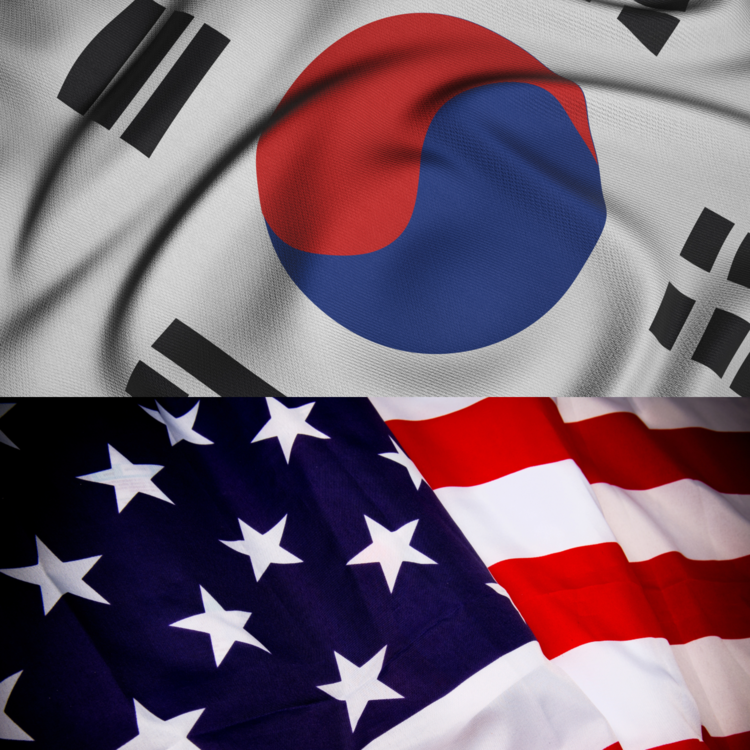

Due to the Ukraine war, the international situation has become very unstable. With this political instability, the importance of national security is more emphasized in every country. This is especially true in Korea, a divided country where there remains tension from the Korean War. On March 20, North Korea launched multiple rockets east toward the Yellow Sea. On March 24, they also fired an intercontinental ballistic missile (CBM) toward the East Sea, and this event threatened global security. Former president Jaein Moon and the new president Seokyoul Yoon shared that the state of Korea's security is extremely serious. Yoon, the 20th Korean president of the Korea Republic, is taking steps to strengthen the Korea-U.S. alliance, which is the strongest military relationship for South Korea.
This year marks the 69th anniversary of the Korea-U.S. alliance and the 140th anniversary of the establishment of diplomatic relations between the two countries. In 1882, the two countries signed the Treaty of Peace, Amity, Commerce and Navigation, also known as the Joseon-United States Treaty of 1882. This treaty established diplomatic relations and trade between Korea and the United States. The countries exchange diplomatic envoys so as to maintain mutual friendship and assistance. In 1953, Korea and the U.S. signed the Mutual Defense Treaty Between the United States and the Republic of Korea in Washington D.C.. The treaty represents mutual military assistance in case either country is attacked by force and includes an article stating that the United States must station U.S. troops in South Korea. For decades, both countries have continuously developed relationships in politics, economy, society, culture, and various other sectors. The Korea-U.S. alliance, a linchpin of security and prosperity on the Korean Peninsula and Northeast Asia, is now expanding its cooperation to supply chains, economic security, regional cooperation in Southeast Asia and Central America, and global issues such as vaccines, climate change, and high technology.
According to the Ministry of Foreign Affairs (MOFA) press release, representatives from Korea and America met on February 12. During the meeting, Euiyong Chung, the minister of MOFA, and Tony Blinken, the United States Secretary of State, expressed their support for Ukraine and they also included comprehensive strengthening of the alliance and mutual concerns over North Korea's successive missile launches. In addition, Defense Minister Wook Seo visited Camp Humphreys, which is located in Korea and also the largest foreign base of America, on March 16 to express his gratitude to the U.S. Forces Korea (USFK) and the United Nations Command (UNC) for their continued commitment to maintaining peace and security on the Korean Peninsula. "Today is a great opportunity to thank Minister Wook Seo for his constant support and dedication to strengthening the Korea-U.S. alliance," General LaCamera said. General LaCamera and Minister Wook Seo emphasized the importance of the Korea-U.S. alliance and maintenance of a strong combined defense posture to protect peace, security, and stability on the Korean Peninsula.
Meanwhile, the vice foreign ministers of South Korea, the U.S., and Japan held telephone talks on North Korea's ICBM launch. The talks were aimed at sternly responding to escalating tensions and calling for an immediate end to North Korea's international threats. In addition, these countries agreed to closely communicate and cooperate at all levels on additional U.N. Security Council sanctions and future countermeasures against North Korean provocations.
Yoon's pledge for the alliance is as follows. First, to help curb the expansion of North Korea's nuclear weapons program, Computer Post Exercise (CPX) and Field Training Exercise (FTX) will be implemented again. The second is the normalization of the THAAD base. THAAD is a high-altitude missile defense system. The move is aimed at preventing North Korea from nuclear and missile threats. Third, he announced the formation of a South Korea-U.S. policy group to discuss "mutually beneficial" policies with the U.S.. On April 5, the group went to Washington D.C. for a conference with U.S. officials. Fourth, the new Korean government will continue to cooperate with the U.S. and further expand the alliance in various fields, including global supply chains and space and cyber technology. Finally, Yoon will take under consideration the suggested participation in 'the Quad,' which is an unofficial security conference currently involving the United States, India, Japan, and Australia.
North Korea has been conducting a series of missile provocations since February. Yoon and Defense Minister Seo criticized North Korea's moves as being contrary to the September 19 Korean military agreement signed by then ex-President Moon and the supreme leader Jungun Kim in Pyeongyang. Yoon and Seo argued the North violated a clause stipulating that the South and the North would stop all hostilities against each other. Meanwhile, North Korea has poured out raw criticism, calling the South Korea-U.S. joint drills a threat to the North and the destruction of peace on the Korean Peninsula.
Meanwhile, the United States is also moving to strengthen Korea-U.S. relations. In February, President Biden appointed Philip Goldberg, a former North Korean sanctions coordinator, as U.S. ambassador to South Korea, a position that has been vacant for more than a year. Mr. Biden congratulated Yoon for winning his election and also said he expects strong cooperation between South Korea and the United States. He added that the relationship between the two countries is 'ironclad.' President Biden will visit South Korea in May to discuss strengthening the KOR-US. alliance and the Korea-U.S.-Japan cooperation system, and Korea's participation in the Quad. If Biden visits South Korea, it will be the first time a U.S. president has visited Korea in 29 years.
In the early days of the alliance, America unilaterally helped South Korea, but now both countries are helping each other. When there is a case of development cooperation for countries that are important to Korea and the United States such as ASEAN countries, Korea and the U.S. conduct the work together. They stand for one of the strongest relationships in the world, assist each other with their difficulties, and solve various problems of global society. For the Republic of Korea, the Korea-U.S. alliance is the most important relationship beyond military significance, and the nation must not stop making continuous efforts in various ways for mutual development in the future.
Reporter,
Seunghoe Koo rokeet@seoultech.ac.kr


 Comment 0
Comment 0 Posts containing profanity or personal attacks will be deleted
Posts containing profanity or personal attacks will be deleted